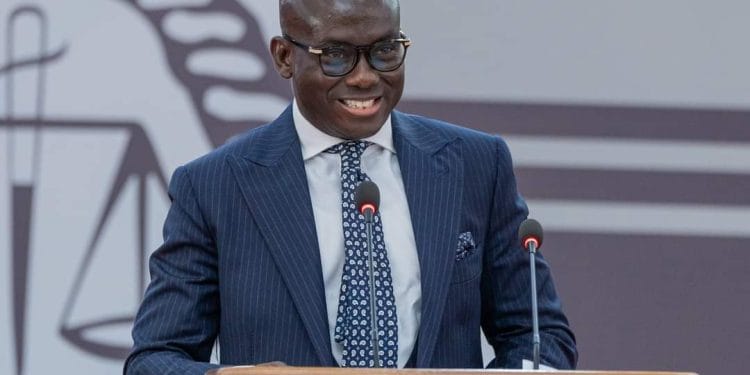Attorney General and Minister of Justice, Godfred Yeboah Dame, has stressed that no institution or individual in Ghana holds sovereign authority, as sovereignty ultimately resides in the people of Ghana under Article 1 of the Constitution.
Addressing attendees at the swearing-in ceremony of the new President and executives of the Ghana Bar Association (GBA) on Monday, November 4, Dame underscored the Constitution’s role as the nation’s supreme law.
He highlighted that this supreme law entrusts the Judiciary with the final judicial authority, affirming that every individual or institution, including the President, is subject to the Judiciary’s power to interpret and apply the laws of Ghana without exception.
“In this country, no institution or individual has sovereignty. In accordance with Article 1 of the Constitution, sovereignty resides in the people of Ghana and the Constitution is the supreme law of Ghana. The supreme law of Ghana has vested the Judiciary with final judicial power.
“Every individual or institution, including the person who takes precedence over all in this country – the President – is subject to the court’s powers to interpret and apply the laws of Ghana without question,” he said.
He further explained that this principle is fundamental to the functioning of a civilised society.
“Whatever procedures are utilised by any institution in this country for the conduct of its activity must comply with the Constitution and the laws of Ghana. A default of same will render such procedures liable to be declared by the courts as unconstitutional or illegal. It is as simple as that, and it is non-negotiable.”
Dame called on all legal practitioners to support the Judiciary, emphasising its crucial role in sustaining Ghana’s democracy.
“We therefore have a duty to support the Judiciary in its work, which is fundamental and crucial to the sustenance of Ghana’s democracy,” he said.
His comments come days after the Supreme Court of Ghana dismissed an application by Speaker of Parliament Alban Bagbin, who sought to reverse a previous ruling that blocked his declaration of four parliamentary seats as vacant.
This decision added another layer to the ongoing legal debate surrounding the scope of the Speaker’s powers and the judiciary’s role in parliamentary decisions.
Speaker Bagbin’s application aimed to nullify the Supreme Court’s decision that temporarily halted his ruling on the four seats.
The Speaker also sought to set aside a writ filed by Majority Leader Alexander Afenyo-Markin, which had requested judicial intervention to prevent the Speaker from issuing further declarations on the disputed seats.






